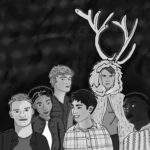A: I think putting your work out for the public is always risky. I’ve been on both sides of the creative process. At university in my studio classes, students and professors would critique my art. I did the same. As an avid reader and book blogger I’ve reviewed other authors informally. Part of every review is subjective and the rest is good to evaluate and use to improve your future work. I think the scary part for any creative endeavor is waiting for those critiques and reviews to come in. What if your story is loved? Can you live up to expectations? What if it’s loathed? Can you withstand the criticism? But I think the risk is worth it, especially if you like the story (and hopefully you do because you wrote it!)
Author
Q: How would you like to grow as a writer?
A: I would like to get better at it all. I always believe that a talent can be improved upon. If I had to pick something specific then I would like to get better at narrative and voice first. I feel pretty comfortable with dialogue and world-building.
Q: If you could attend any event in history what would it be?
A: The Sermon on the Mount.
Q: Are you just a book blogger and author?
A: I’m also a technical publications librarian. I maintain publications used by professionals so they can do their job safely and confidently with the knowledge that they are working with the most current materials.
Q: What do you do when you’re not writing?
A: I love playing with my dog, Oskar. Taking him on adventures is a lot of fun. I enjoy planning game nights with friends. We make food and play board games. It’s so much fun. Also, I love reading, going to the theater (movies/plays), and traveling. I volunteer at my church and help where I can. I also like watching my favorite shows on TV. I live close to my day job, which means I can go home at lunch. So my lunch dates with my coworker and beta reader are a big highlight during my work week. We spend our time watching Korean TV dramas and chitchatting.
Q: What’s the hardest part about editing?
A: Finding and replacing the malapropisms within the text. They’re more difficult to spot than other errors because usually it is a real word sitting in the place of the correct word choice. Spellcheck won’t find it. Many readers will also skip over the malapropisms without seeing them, either because they don’t know better, or they do, and their mind replaced the word with the correct word instantly as they read the passage. Even after editing the book, I would still find malapropisms.
For example in the original text of Zaria Fierce and the Secret of Gloomwood Forest one of the characters said to another, “So we’re at a bypass then?” The real word is impasse (the point where progress is halted due to disagreements, lack of comprise, and physical barriers), not bypass (a road around a place, a reroute or detour to avoid something). As you can see, the words have two very different meanings and the sentence meaning changes depending on which one is used. The contextual clues would allow you to deduce what I really meant as the author, but it’s far better if I fix the malapropisms before you get your hands on the book. 🙂





